Periodontal Therapy – Lewisville, TX
Healthy Gums, Healthy Smile, Healthy You
 Periodontal disease, also known as gum disease, is one of the most common oral health conditions that patients face. Different estimates have found that 50 - 80% of U.S. adults have some form of periodontal disease. Even more concerning, it can have devastating consequences for oral and overall well-being if it is left untreated. Fortunately, Dr. Capehart and our team offer effective periodontal therapy in Lewisville to help you enjoy healthier gums and a healthier body.
Periodontal disease, also known as gum disease, is one of the most common oral health conditions that patients face. Different estimates have found that 50 - 80% of U.S. adults have some form of periodontal disease. Even more concerning, it can have devastating consequences for oral and overall well-being if it is left untreated. Fortunately, Dr. Capehart and our team offer effective periodontal therapy in Lewisville to help you enjoy healthier gums and a healthier body.
What Is Periodontal/ Gum Disease?
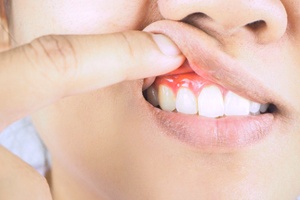
Gum disease is an infection of the gum tissue. In its early stage, it is known as gingivitis, which is relatively mild and does not cause permanent harm to the oral tissues. If it remains untreated and advances into periodontitis, however, irreversible damage may occur to both the gums and the bone that support the teeth.
Often, poor oral hygiene is a major contributor to gum disease. Additional factors, such as genetics, smoking, hormones, and more can also play a role in its development.
The Dangers of Periodontal/ Gum Disease
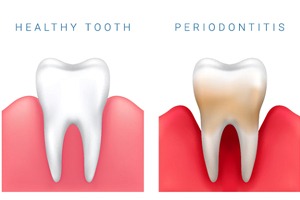
At first, gum disease may not seem like a big deal. When it is just starting, it may feel like a mere annoyance, often causing symptoms like red gums, bleeding gums, and swollen gums. You might also notice a bad taste in your mouth or experience bad breath. As the disease progresses, though, the symptoms become much worse. You may notice that your gums start to recede, causing your teeth to appear longer. Your teeth may also become loose, making it more difficult for you to eat a balanced diet. Eventually, the teeth may become so loose that removing them is the best course of action.
Scaling & Root Planing
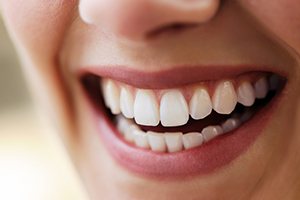
There are different ways to treat gum disease. For very minor cases, adjustments to your oral hygiene routine, along with close monitoring by Dr. Capehart, might be all that is necessary to reverse your condition. If the gum disease is more advanced, you might need to schedule an appointment for scaling and root planing. This form of periodontal treatment in Lewisville essentially amounts to a deep cleaning of the mouth. Scaling removes plaque and calculus from the teeth and from around the gumline, while root planing focuses on smoothing out the tooth roots so it is more difficult for bacteria to cling to them. Here’s what you can expect from this treatment as well as a few aftercare tips to help you recover from your visit.
Do I Need Scaling & Root Planing?
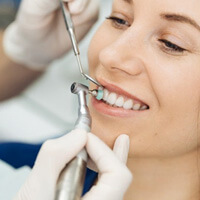
In dentistry, “deep cleaning” typically refers to scaling and root planing treatment. During your routine checkup appointments, Dr. Capehart will thoroughly evaluate your mouth and oral health to determine if you’re free of any indications of periodontal disease. This could involve swelling, bleeding, and inflammation in the gums. If our team does detect signs of complications, we can work to address them early on so that we can help avoid more serious harm to the rest of your smile. Scaling and root planing are designed to remove accumulated bacteria under and around the gum line. Additionally, your tooth roots will also be smoothed over to promote more efficient healing while the gums reattach to your pearly whites.
The Process of Scaling & Root Planing
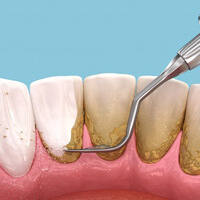
In most cases, this gum disease procedure is completed within two separate appointments. The initial portion of the process involves “scaling,” which is typically when Dr. Capehart carefully scrapes off any plaque and tartar around your gum line by using special dental tools. Our team will also treat the areas beneath the gums where it’s easiest for bacteria to develop.
After this portion of the treatment is completed, you’ll take time to have your gums recover before we begin with root planing. This process involves smoothing the parts of your roots that are typically hidden under the gum line, that way your gums can stick more easily to your teeth as well as making it incredibly difficult for germs to accumulate in the future. This will further reduce your risk of forming periodontal disease later down the road.
Aftercare Tips for Scaling & Root Planing

Once you’ve undergone scaling and root planing, you’ll likely experience some soreness and slight swelling around your gums. Fortunately, this should only be temporary and you’ll typically feel back to normal after several weeks. During your recovery, you might consider taking these precautions:
- Rinse your mouth with salt water after meals to get rid of food debris and avoid irritation.
- Carefully brush twice daily with fluoridated toothpaste and a soft-bristled toothbrush.
- Floss between your teeth at least once a day.
- Avoid particularly acidic, hot, or spicy foods.
- Stick with a softer food diet for 48 hours after your appointment.
- Avoid excessive physical activity following your treatment.
Gum Disease & Your Overall Well-Being

When it comes to gum disease, more than just your oral health is at stake. Research has found a strong correlation between untreated gum problems and a number of systemic health conditions, including high blood pressure, heart attack, stroke, preterm birth, Alzheimer’s, and more. While gum disease’s connection with such problems is not fully understood, many researchers believe that the bacteria that causes it can lead to other problems when it sneaks into the bloodstream. Gum disease also increases the body’s burden of inflammation, which can contribute to multiple health issues.
Gum disease is nothing to take lightly! If you suspect you have it, contact our team today to schedule a periodontal consultation. Your fast action could preserve your smile and support your overall wellness.
Gum Disease Treatment FAQs
What happens if I don’t treat gum disease?
When left untreated, the early signs of gum disease can advance and become more serious. Additionally, periodontitis, which is the late stage of gum disease, is one of the leading causes of other oral health problems, like tooth loss. That’s why our team at Capehart Dentistry screens for gum disease at each of your routine checkups and cleanings, allowing us to treat the issue before it has an opportunity to cause permanent damage to your smile.
How can I prevent gum disease?
The best way to prevent gum disease is by maintaining a good home oral hygiene routine as well as coming in for your six-month checkups and cleanings. Brushing twice a day for two minutes with fluoride toothpaste, flossing at least once a day, and rinsing daily with antibacterial mouthwash will help prevent the build-up of harmful oral bacteria that lead to gum disease. Then, your dental hygienist and dentist in Lewisville can clear away all hardened plaque from the areas of your mouth you aren’t able to get to at home.
What are the symptoms of gum disease?
The symptoms of gum disease can vary depending on what stage the condition has progressed to. We advise all of our patients to keep an eye out for the common signs and to schedule an examination if they experience any of the following:
- Bleeding gums when you brush or floss your teeth
- Swollen, inflamed, and puffy gums
- Gums that are bright red, dark red, or dark purple in color
- Bad breath that won’t seem to go away
- Pus between the teeth and gums
- Discomfort while chewing
- Loose teeth
Can gum disease be reversed?
The good news is that gum disease can be reversed when it’s caught early on, which is why our team regularly screens for it. Oftentimes, when we notice the early signs of gum infection, we may recommend either improvements to your home oral hygiene routine or a deep cleaning for an added level of prevention. In many cases, this can reverse symptoms of gingivitis.
Is gum disease contagious?
While the bacteria within the mouth that causes gum disease can be passed through saliva, you can’t “catch” gum disease by kissing someone or sharing a straw, so don’t be worried about that!
